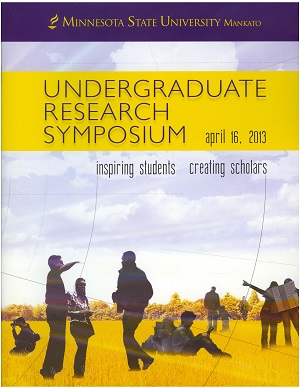Sexual Identity Transformation of Gender and Women's Studies Students
Location
CSU 204
Start Date
16-4-2013 10:05 AM
End Date
16-4-2013 11:05 AM
Student's Major
Sociology and Corrections
Student's College
Social and Behavioral Sciences
Mentor's Name
Emily Boyd
Mentor's Department
Sociology and Corrections
Mentor's College
Social and Behavioral Sciences
Description
It is a common stereotype that Gender and Women’s Studies (GWS) shifts women’s sexual orientation away from heterosexuality. This myth is commonly used to keep women from calling themselves feminists or joining the GWS major. It is important to understand where this myth comes from and how or if the sexuality of women is affected by feminism or GWS courses. Through in-depth, semi- structured interviews of women in upper level GWS courses, the data was collected and analyzed. The most important finding was that women in the major were more comfortable in their sexuality and were able to communicate more efficiently with their partners and others. Women also began to recognize their ability to say no and not succumb to sexual acts solely because their partners wanted to. Through this research it can be recognized that GWS may play a role in supporting women’s sexual maturity and comfort with their sexuality. While it is a stereotype avoided by feminists that women’s sexuality is affected, perhaps it should be reexamined and seen as a positive aspect of theorizing about gender and sexuality. When women theorize about these topics in class they begin to relate the knowledge discussed in class to their own lives. Instead of seeing women’s shifting sexuality as a bad aspect, the impact that GWS has on women’s sexuality should be embraced and utilized throughout the courses.
Sexual Identity Transformation of Gender and Women's Studies Students
CSU 204
It is a common stereotype that Gender and Women’s Studies (GWS) shifts women’s sexual orientation away from heterosexuality. This myth is commonly used to keep women from calling themselves feminists or joining the GWS major. It is important to understand where this myth comes from and how or if the sexuality of women is affected by feminism or GWS courses. Through in-depth, semi- structured interviews of women in upper level GWS courses, the data was collected and analyzed. The most important finding was that women in the major were more comfortable in their sexuality and were able to communicate more efficiently with their partners and others. Women also began to recognize their ability to say no and not succumb to sexual acts solely because their partners wanted to. Through this research it can be recognized that GWS may play a role in supporting women’s sexual maturity and comfort with their sexuality. While it is a stereotype avoided by feminists that women’s sexuality is affected, perhaps it should be reexamined and seen as a positive aspect of theorizing about gender and sexuality. When women theorize about these topics in class they begin to relate the knowledge discussed in class to their own lives. Instead of seeing women’s shifting sexuality as a bad aspect, the impact that GWS has on women’s sexuality should be embraced and utilized throughout the courses.
Recommended Citation
Vetter, Brooklyn. "Sexual Identity Transformation of Gender and Women's Studies Students." Undergraduate Research Symposium, Mankato, MN, April 16, 2013.
https://cornerstone.lib.mnsu.edu/urs/2013/oral-session-04/3




